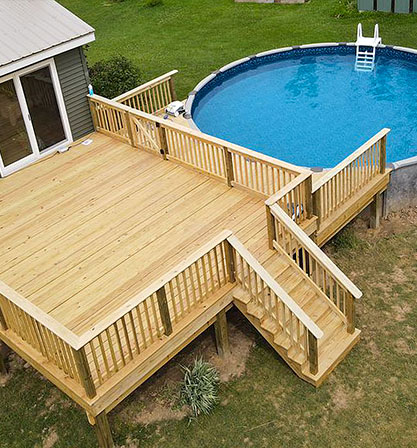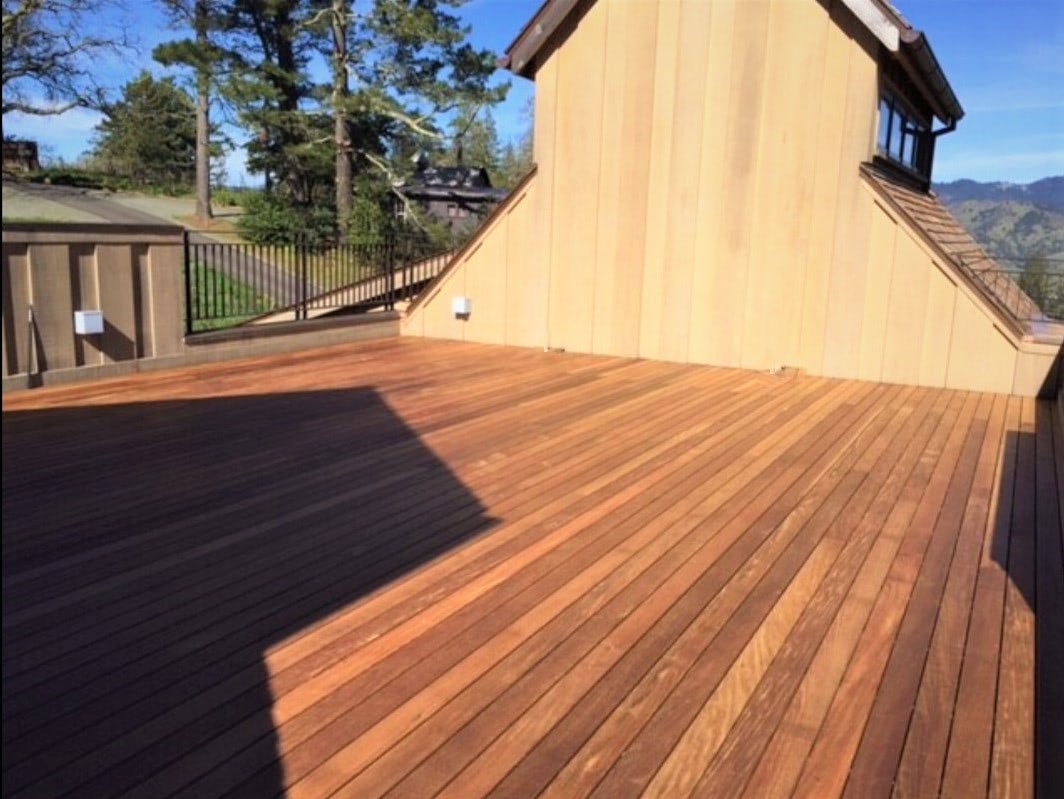Just how to Choose the Right Materials for Your Deck Setup Task
Picking the appropriate materials for your deck installation project can seem overwhelming. There are numerous factors to consider, from sturdiness and upkeep to aesthetics and ecological influence. The choice between traditional wood and composite products, each with its very own collection of benefits and disadvantages, can be especially challenging. The key is to balance your budget, layout choices, and way of life needs to create a deck that will boost your exterior area for many years to come.
Recognizing the Different Kinds Of Deck Materials
When embarking on a deck setup task, the selection of products comes to be a critical choice. Compound products, on the various other hand, are a blend of wood and plastic, giving toughness and resistance to weather components. By understanding these distinctions, property owners can make an extra enlightened choice on the most appropriate deck material for their details requirements.
Reviewing the Toughness and Maintenance Requirements of Deck Products
Assessing the durability and maintenance demands of deck materials is a vital action in deck installation. Longevity includes the material's capability to stand up to extreme climate condition, deterioration, and its long life. As an example, cedar and redwood are normally immune to rot and pests, making them long lasting choices. On the various other hand, pressure-treated wood, while sturdy, might require even more upkeep because of its susceptibility to breaking and warping.
Understanding maintenance requirements is equally important. Some products need routine sealing or discoloring to preserve their appearance and resist wetness damage, while others, like composite decking, require less upkeep. By evaluating these factors, one can pick the most ideal decking material, making certain an equilibrium in between durability, upkeep demands, and visual appeal.
Cost Analysis: Comparing Wood and Composite Decking
Although price might originally appear like a second concern, it is a substantial factor when contrasting timber and composite outdoor decking. On the other hand, composite decking, while pricier initially, requires less upkeep, possibly lowering lasting prices. Possible deck proprietors should consider their budget plan and determination to maintain their decks when making a decision between timber and composite decking.
Aesthetic Appeals and Style Adaptability of Decking Materials
Natural timber decking offers a traditional, ageless look, while composite materials provide a broad array of colors and textures to suit varied preferences and designs. Composite materials, while much less versatile in layout, are still versatile sufficient for the majority of deck styles. These factors, for that reason, are crucial factors in the option of outdoor decking product.
Environmental Effect of Decking Materials
When selecting decking materials, one have to take into consideration not only aesthetics and sturdiness, yet also the ecological effect. It's vital to analyze the sustainability of materials and check out recycled outdoor decking alternatives. Additionally, recognizing the prospective influence on local ecosystems will certainly guarantee an extra environmentally liable selection.
Assessing Material Sustainability
In the realm of deck building, assessing product sustainability is an important action. This entails assessing the environmental effect of each possible material, thinking about factors such as the power needed for its manufacturing, its carbon footprint, and its end-of-life disposal or reusing options. Wood is an eco-friendly source, Learn More but unsustainable logging methods can lead to logging. Composite outdoor decking products typically integrate timber and plastic, lowering the demand for new lumber yet boosting dependence on fossil fuels. Aluminum and other steels might be extra durable and recyclable, yet their removal and processing can read review be energy-intensive. Hence, the choice of outdoor decking materials ought to balance performance, looks, cost, and sustainability to make certain a liable and long-lasting installation.
Recycled Decking Alternatives

Compound decking is particularly preferred because of its durability and convenience of maintenance. It's resistant to rot, pests, and fading, making it a lasting choice. Recycled plastic decking, on the various other hand, is extremely resistant and requires marginal maintenance. While these materials might bring a greater initial cost, their longevity and minimized ecological influence make them a smart financial investment for the eco-conscious house owner.

Impact on Local Environments
While the benefits of making use of recycled products for decking can not be overemphasized, it's equally essential to think about the more comprehensive ecological effects of these options. Proper disposal of old decking is crucial to lessening landfill waste. Essentially, an eco-conscious deck job needs mindful material option, sustainable sourcing, and responsible disposal.
Making Your Last Choice: Tips for Selecting the Ideal Deck Products
As the post shifts into the subtopic of "Making Your Last Choice: Tips for Choosing the very best Deck Materials", it is critical to understand the selection of deck materials available. Striking a balance in between durability and aesthetic appeal is official website crucial in this option procedure. The complying with conversation will guide viewers in making an educated option based upon these crucial factors to consider.
Comprehending Various Deck Products
The job of picking the right materials for your deck setup can seem intimidating due to the vast array of options offered. Nevertheless, understanding the different materials can simplify this process. Wood is a prominent selection, using a traditional visual and price. Types of timber used consist of pressure-treated lumber, cedar, and redwood. Compound materials, made from a mix of wood and plastic, are low-maintenance and resistant to rot and pests. Vinyl or PVC decks are much more long lasting and need much less maintenance than composite materials, however they can look less all-natural. Light weight aluminum decks are solid, light-weight, and resistant to rot, however they are also the most pricey alternative. Each material has its own benefits and drawbacks, making it essential to consider your specific demands prior to making a decision.
Sturdiness vs. Aesthetic Appeals Equilibrium
Stabilizing sturdiness with visual appeals can be a difficulty when choosing deck materials. The choice often steams down to individual preferences and the deck's meant usage. High-traffic locations may necessitate sturdy products like composite decking, which endures wear and tear however might do not have the all-natural elegance of wood. On the various other hand, wood offers an ageless allure and heat that synthetic products struggle to reproduce. However, it needs more maintenance and might not last as long. Therefore, homeowners need to strike an equilibrium, considering both the deck's useful needs and their visual choices. By doing so, they can ensure their deck remains a functional and appealing outside room for several years to come.
Conclusion
In final thought, choosing the ideal materials for your deck installment job requires cautious factor to consider of factors such as longevity, upkeep, price, looks, and ecological impact. Whether you decide for traditional wood or composite products, your selection needs to line up with your spending plan, layout choices, and lifestyle. Inevitably, the most effective outdoor decking product is one that enhances your outside space and gives pleasure for many years to come.